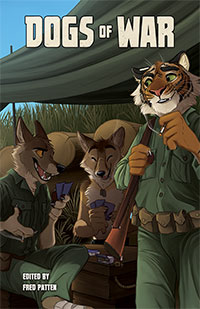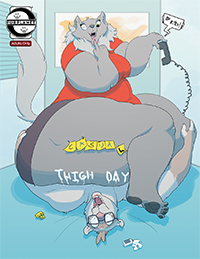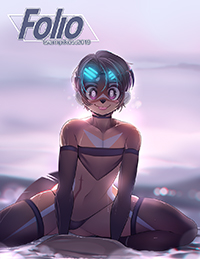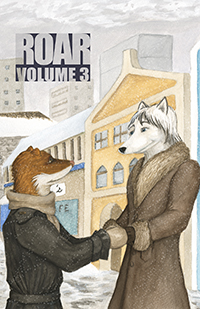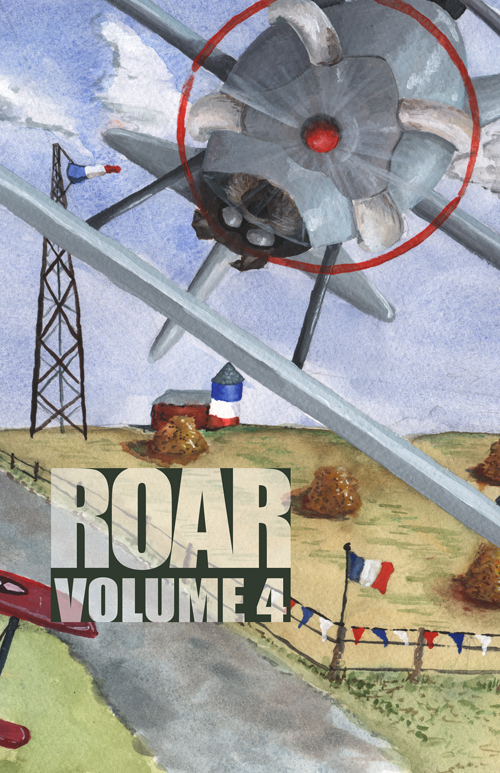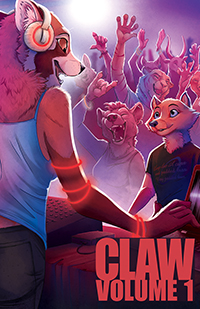|
Product Index Informational Links Connect with us |
|
Item Details Recommended Items Item Reviews 
Mary E Lowd ROARS again!
ROAR 7 review by Greyflank
(Full Disclosure: I have a story in this book: Unbalanced Scales. I will "review" that story last. I mean, I could skip it entirely, but I do so like talking about myself and my stories.)
Mary E. Lowd returns as editor for Roar this year and completely avoids the curse of the 2nd album! The theme this year is LEGENDS. There are 17 takes on what makes a legend from 17 different authors. While some are more successful than others, there are no clunkers – for me, at least. Your mileage may vary.
As is my wont, I've written a little review of each story, so lets get to it.
Crouching Tiger, Standing Crane" by Kyla Chapek
A Shaolin Legend; the Origin of A School of Martial Arts
Everybody loves Kung Fu Fighting...
Sorry, had to get that out of my system.
This was an excellent story which I think took needed liberties with Ming China's histories. Not that I'm an expert, but obviously a Furry Universe China would suffer an abundance of unavoidable diversity that the historical China did not. This is the challenge Furry writers face whenever they want to recreate a culture.
I do not know if the red boats or the suppression of the Monks actually took place in our history. It doesn't matter (to me) because it all felt very authentic to me. I would be very curious to see what a true student of Chinese history thinks about the cultural translation.
The various species in this story are well presented, in both the framing sequences and in the legend itself. A plus on the Furriness. The snap shots of time and the years leaping ahead are handled well in most respects. Children being children are also deftly handled.
A very fine start to this year's ROAR.
"The Frog Who Swallowed the Moon" by Renee Carter Hall
Fable: The Legend of How Frog Got His Groove On.
I'd describe the legend better, but then there would be a spoiler or two.
This is another Renee Carter Hall success of a simple, strong story that makes me jealous knowing that I could never replicate the like. The story of Frog accidentally stealing the moon is sweet and sure with a strong morale that is seemingly simple and subversively complex. It shows facets of sacrifice, the test of friendship, the taste of recovery, and the price of doing the right thing.
It is an allegory for artists twice over. As someone who lost his voice for years, only to recently rediscover it, I was moved and awed.
"The Torch" by Chris “Sparf” Williams
Modern Legacy: Media Legends
This was a very warm hearted and realistic tale of a fading television of yesterday who's retirement plan is roughly equivalent to how many 9x12 glossies he can sign at events. Sparf has got such a very good handle on this that suddenly I'm beginning to suspect that he's a lot older than I thought. I figured mid-30's at most! Or perhaps he got to fill the role of Jake, the guest liaison, a lot at conventions... either way, I felt this slice of fading stardom was masterfully framed and executed.
Minor quibble: I did feel the Labrador sub-plot was a little awkward at one spot; but I'm all for shades of racism/breedism sneaking into a story. It hinted at a depth that we really didn't get a chance to explore, so it might be my own expectations to explore the allegory of prejudice.
Beyond that, the story left me feeling rejuvenated and hopeful.
"A Rock Among Millions" by Skunkbomb
Urban Legend: A Coming of Age Story
I am a cynical sort; so if someone tried to lure me into the woods to touch a massive "something" for good luck, I'd be as dubious as this cat narrating this slice of life adventure. Sure, getting lost in the woods is the perfect allegory for how the cat's life at the moment. No serious job prospects and siblings doing better than he is.
So far, it's not my favorite, but the idea that this cat might actually be named "Dude" is making me smile.
There was a moment in the story when the cat says his dog friend looked like he "was waiting for a treat," it made me wonder if there were humans in this world. Because while it provoked a good strong image in my head, I'm not sure that's a phrase a cat would use in a world where career choices were important for it.
The dog requesting the cat take his nude photo so the cat could send it to his sister, whom the dog is crushing on, also provoked a strong image. Not a bad one for me, either, for I have only the vaguest appreciation for boundaries. And I do so love that the furry people might be into cross-pollination, but the cat has no reaction to it beyond stating that the sister has a steady.
This is a good story but the furry elements are decoration; not a strong part of the story. In other words, this cat and dog duo could be any human pairing of friends. Sure, the cat has good night vision but that didn't really amp up the story.
"The Pigeon Who Wished For Golden Feathers" by Corgi W.
Fame and Fortune: On being a Legend in your mind
Unless you're a saint, there's always going to be a part of you that wants fame and fortune above all else. Epol the pigeon is no saint. Taken from the streets and rescued from a life of poverty and crime, Epol was taught skills to help raise himself above desperation by the white dove, Olanthum, who is quite possibly a saint himself. The pigeon suspects he might possibly be the best gambler among the Avian population who consider gambling a part of their religion.
Our story begins with the discovery of an open event where he can prove his talent. His mentor and father-figure suggests he not enter this competition, as the skill Epol is most proud of is cheating with his dice.
The pigeon flies off to compete and he nearly blows his own stake in creating the image he wants to project when he's immortalized as he so richly deserves. Once committed to this course, Epol discovers that the temple is aware that cheaters will cheat and that they treat cheaters most harshly.
Corgi does a good job of bringing this game to life; makes it seem familiar, even though I'm sure that I've never played it. Corgi also makes it exciting; and I feel Epol's excitement, too.
In the end, Epol does help create a legend; one of self-sacrifice and love. And, at the risk of spoiling the ending, let me assure you that there's a reason or two for most of the cast to be birds. These reasons elevate the story nicely and make the universe you'll share here much richer for it.
The last few pages of this tale raised the overall story from a 7 to an 8. Good Dog!
"Reason" by Heidi C. Vlach
Lore within Lore; A Legend of Aligare
Aligare is magic world with three distinct races: korvi, aemets and ferrin. They live together in patchwork social strata with equal rights and different merits. Korvi are bird-like. The ferrin are smaller mammals that remind me of squirrel-ferrets. The aemet are bug mammal hybrids. Everyone is peoples and they mostly live in harmony together.
This story centers on two aemet siblings, Linden and Chard, who are tasked with maintaining the health of a plum tree that not just represents the founding of their village, Castaway, but stands as testimony to the spiritual core of the villagers who view the "shrine tree" as a literal gift of Seasu to the founders of Castaway. Yet, the tree is slowly dying.
Seasu delivers a drowning ferrin to Linden, allowing the founding legend of the village to be heard by fresh, new ears, as the little mammal, Vrin, recovers.
This is the first story of the collection, I feel, that really explores the myriad powers of a legend or myth. As entertainment, as history, as guidance, and as morality: the story gets deep yet still feels light.
There is a sense of a greater universe of stories (which there is: https://heidicvlach.com/aligare-lore/) but there's no real need to be "caught up with" the back story.
I did have some minor trouble picturing the varied folk in this story, mind you. I think, ironically, because I was reading a Furry collection, I was sorta stuck on what animals I'm dealing with. I suspect -- having put the story aside for a few days -- that if I'd been reading a collection of SF or Fantasy, I might not have had that trouble.
Nicely done.
"Old-Dry-Snakeskin" by Ross Whitlock
Gospel: Apocalypse as a Folk Tale
This is a hard tale to pigeon hole, for I think the voice and structure is very much a folk tale, but it isn't. I feel like I could spend hours breaking down the story into its component anthropological and literary elements; something I am ill-equipped to do. I would not be surprised to see students a decade from now doing just that with this story.
With the full force of over 40 years reading SF&F behind me, I honestly feel qualified to say that this story is another "Sic Transit… ? A Shaggy Hairless-Dog Story" by Steven Utley and Howard Waldrop. It has the same flavor, scope, and style.
It is and will be a classic story reprinted dozens of times over in obscure places and read in dorm-rooms as roommates make bongs out of unlikely materials. The author had better get an agent.
But, on top of all that, it's a fun story with a snake as the hero and how often do you come across that?
"Kitsune Tea" by E.A. Lawrence
Urban Fantasy: The Power of Imagination
A fateful discovery of an abandoned dollhouse leads a young Kitsune on a quest of exploration and introspection of what it means to be Kitsune... and ultimately, what it means to be Human, in an allegorical way, perhaps.
I really enjoy Rue's journey immensely. I did wonder at how she knew words for some things but not other things outside of her experience of living in the woods. Eventually, I gave up thinking about such silly things. No leaps in logic were daunting, any ignorance of her part were completely logical, so the author's word choices were certainly better than mine would have been. The delivery was smooth and steady; revealing the Kitsune's urban-sharing culture and hierarchy along the way.
The author made one of the best uses of the animal side of things in this collection. The bar was officially raised for the rest of Roar 7.
"A Touch of Magic" by John B. Rosenman
Teddy Bear Picnic: When Imaginary Friends Return
Disclaimer: I had submitted a story with a talking teddy bear amid humans, too. While I don't think I have anything like sour grapes about the rejection I am only human. Well, I am when I'm not a typing horse, at least!
I liked George, the mild mannered bear of a man who had enough of a kid left inside of him to accept Susy the Teddy showing up out of nowhere. I liked the premise of the entities that seems to visit so many growing children and is basically anti-imaginary friend. I liked George's interactions with his wife and non-moody child; they were so spot on. I even liked the Justin Bierber poster.
I didn't like the confrontation scenes with the entity and I was especially put off by Susy's language during the final confrontation. Not that I'm a prude. The contrast of what one expects from a plush children's toy and what one gets can be used used for great effect. Here, it felt a bit like a fumble here.
In short, this felt like a story of exorcism without the religion. Not that this makes it a bad thing, automatically, but I think a little more tweaking was called for.
"Long Time I Hunt" by Erin Lale
Native American Legend: Cherokee Cat Spirit
What a wonderful piece, placing the reader in the head of a spirit cat, bound with a purpose and love to the lineage of his first human friend. It's sweet and sad in turns, but always slightly poetic, as the spirit returns again and again to the Earth. To the possessor of his totem.
As his history and his bones are forgotten the Hunter feels his role and powers diminish over the generations. Yet, still he hunts and yearns for the companionship of his first people. The ending is elegant and sweet, giving the Hunter a reason to purr at last.
"The Butterfly Effect" by Jay “Shirou” Coughlan
Magic Cyborgs: The Cover Legend
Rahni and Roi are wolves that walk like men, the "best part of a bad plan." They were selected to take on the burden and the risk of a new magical weapon that would help save the Kingdom from a plague of a biblical proportions. Instead of locusts, however, they faced butterflies that spread madness and steal souls.
Over the years, they fight a battle to hold the line against a mindless enemy that just seems to keep coming. I must admit to being more than a little uncertain of the full scope of the threat. Outside of the Kingdom, I infer that the remainder of the world is an ecological disaster with butterfly controlled zombies and that any surviving kingdoms are in similar straights.
Still, the story is less about the war and more about the scars. Rahni has fallen to madness and Roi has spent two decades trying to avoid the same fate, as well as trying to do the work of two. He may be overcompensating to the point of subsuming his own needs; becoming an automaton of logic... to avoid pain.
Roi is forced into time off, allowing him to experience a lot of overdue introspection. Flashbacks allow for the story to have enough action to balance the wolf's soul-searching and to put things in perspective.
I felt something was missing, although I cannot put my finger on it. The final flashback came very close to providing it... but I'm still not sure what that would be.
"The Roar" by John Giezentanner
Prehistoric Legend: Inherit the Earth
I put this review aside for a few days because I am not at all sure how to describe the story without spoilers. Young dinosaurs adopting younger dinosaurs and trying to avoid a world full of monsters. Which seems simple enough; but it isn't.
I found this a wonderful and bittersweet story of growing up; an allegorical nod to growing up homeless and trying to avoid the bad guys. A great use of reptiles.
His bio in the back of the book provided the best and biggest laugh in the book.
"Trust" by TJ
Mysterious Lover: Hidden Legend
A comfy M/M tale with a fox and coyote in a modern setting. It's almost funny animals. Except when the wolf's scent sniffing abilities do come into play, these could have been normal humans. In TJ's written voice, I found this perfectly charming. I picked up on the todd's anxiety in slow growing strides in a very realistic way. A more zoomorphic slide might have been cluttered with the distracting details of being supplied a fox emotive gestures.
I'll not reveal the ending, but I am a little dubious of the todd's rejection of part of what his coyote shares... but maybe that is a struggle for another day. Or maybe I am too cynical.
"A Thousand Dreams" by Amy Fontaine
Cosmic Legend: Howls of Sympathy
Life and death and life and death again as Tarascus learns what it means to go from a meaty thing to a creature made of stars. He becomes a Legend by accident of birth and the belief of his fellow wolves
I am not sure exactly what to make of this story. It's not a bad story; it is literally cosmic in its reach and that's a lot of miles to cover. The ending seems very harsh and I am not sure what the author is trying to say about a universe that showed so many wonders.
The Golden Flowers by Priya Sridhar
Old Friends: When a tall tale proves true...
For the purposes of this story, let's assume that either rhino horns do not grow back in this universe, or Sushil the rhino has a rasp in his ashram. Otherwise, this is very sweet story might fall over a bit. Over the 50 years that the rhino hid in the ashram, he became first a hermit, then a rumor, and then a nearly forgotten legend, guarding the yellow flowers that grow in the mountains.
Golden flowers that Emery needs; not just as a medicine but as a quest to prove that he is not so helpless to his parents.
I really liked the special touches, like the martins that crawled all over the rhino. I got the distinct impression that the young visiting goat wasn't expecting them and might have been staring a bit. I especially like that I wasn't told as much, just left the impression.
Puppets by Ellis Aen
Virtual Hero, Real Hero: Legend of Tomorrow
I really liked the setting, although I at first thought I was dealing with oddly designed superheroes/mercs. Much of the story takes place in the virtual setting(s) of a future at war. In the virtual world, soldiers are on the front lines attempting to defeat their opponents so army intelligence can get new ideas and stress test new strategies. In the real world, there is also a gigantic space war at a distance, but it is getting closer.
In these two ways, the story is similar to Ender's Game between the war games and the real world. Except, of course, we aren't dealing with an exceptionally bright boy too young for any of this. Stargrave is a young man, experiencing adult feelings and some regrets and survivors remorse. In the virtual world of instant gratification, he's become a legend among the vitual warriors for keeping his Stargrave persona alive for such a long time. A battle record that follows him into the real world.
There's also a little romance and the sweetest dance scene that I have ever read. EVER. This scene literally brought me to tears.
A part of me wants to ask the author about the virtual suicides; a sort of a mirror to the phrase "A coward dies 1,000 deaths," but frankly, I doubt the answer would be anywhere near as meaningful to me as that one dance scene was. Anyone who's fallen in love with someone before they met them in person, will recognize this moment.
What a great way to end this collection. I was all tears and snot typing the first draft of my review of this story.
Summation:
Overall, I liked Old-Dry-Snakeskin, The Frog Who Swallowed the Moon, and Puppets the best. The first two were the lightest of the collection, despite being about loss. Puppets, on the other hand, was far from light, but it pulled everything together and shone like a laser beacon when the time was right.
I liked A Thousand Dreams and A Touch of Magic the least. Neither were bad stories, mind you. One tale simply threw my out of the story too often. The other left me uncertain about what I'd just been told.
"Unbalanced Scales" by Bill Kieffer
My Story: A Rap Legend from Aesop's World
I have daddy issues, and one of the things I always wanted to do was a nod to the movie, The Jazz Singer (kids, ask your grandparents). The plot of this was, basically, Jewish kid is a great singer and is poised to take over his father's position as a Cantor (kids, ask your rabbi) in early 20th Century America. The kid, instead, takes up jazz music for fun and profit, totally pissing his father off. By the end of the movie, the father is on his death bed and finally hears his son sing on the radio and realizes there's beauty and god in this music, too, if one is singing from the heart.
This story was my attempt to pay homage to this landmark film and the culture conflict between generations that almost every modern generation has to deal with.
In Aesop's World, Chromatics revere the prophet Mosaic. It was founded in Homeland (the Middle East) and it is one of the three main religions that populate this setting of talking animals. There are nods (I hope they are accepted as respectful nods) to some of the traditions and teachings from that area of the real world peppered in the Chromatic culture. Any faults you see in this culture are mine alone and no reflection on their real world counterparts. The object was to portray a strong culture and religion built around mindfulness, humility, respect, and reverence that can contrast the popular culture of the time. It's not meant to portray any group of people as cold blooded animals... except that sometimes racist and bigots will do exactly that.
I hope I presented just enough in the story to hint at what Saint George was rebelling against and what Frosty was trying to hold onto.
Bill Kieffer
10/22/2016
|
|
Related Items |














